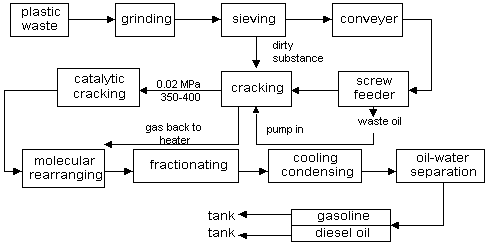| 首页 | 环保技术∶能源∶节能 |
Conversion of Waste Plastic to Liquid FuelAt Beijing Likun Chemical Plant
Beijing Likun Chemical Plant is one of the few factories in China's capital successfully engaged in conversion of plastic wastes to liquid fuels. Technology DescriptionRaw materials The raw materials used to produce liquid fuels include polyethylene, polypropylene and polystyrene from plastic wastes such as plastic film for farm use, woven bag for cement, urea, foam PS lunch boxes and packing materials, and food package bag, etc. Conversion process Plastic wastes are cleaned from impurities -- they are washed and dried, and then fed into a cracking vessel under normal pressure. Here cracking and catalysis take place on special catalysts to generate hydroarbon oil, which is then fractionated to separate gasoline and diesel respectively. Below is the process flow chart:
Technical features Under atmospheric pressure and temperature about 400 °C, the operation is continuous -- from feeding of raw materials, producing gasoline and diesel to discharging of gas and solid residues. With an automated blending device at the bottom of the reaction container, coking is effectively prevented. The whole process it is stable, safe and reliable. DL catalysts are specially developed with high reactivity, responsive to specific products. Effluent vapour from reactor is directly fed to fractionator for obtaining liquid fuels (gasoline and diesel). Solid residue is recycled as production fuel. A little non-condensable hydrocarbon gas is burnt out, and therefore, no pollution is created. The processing is adaptable to different types of raw materials such as plastic waste, waste solvent oil, waste diesel fuel, waste lubricating oil, vegetable oil bottom, etc. Product Quality The quality of the gasoline has been tested with the following testing results:
Economic AnalysisThe capital investment for a conversion line with a capacity of producing 1000 tons of gasoline/diesel annually totals 1,300,000 yuan or $162,500 (exchange rate: $100=800 yuan) in China. The market price of liquid fuels in China is 1.85 yuan per liter for gasoline, and 1.70 yuan per liter for diesel fuel (price of 1994). Converted to weight basis, the average price is 2,400 yuan a ton. Costwise, sales price of plastic wastes listed by recycling agent is 700 yuan/ton, and utility cost for production include bituminous coal at 220 yuan/ton, and electricity at 0.5 yuan/kwh, plus average wage per labor of 600 yuan/month while monthly output of liquid fuels produced by Likun Plant is 100 ton/month. Below are cost and benefit estimations of producing one ton of liquid fuel from waste plastics.
Environmental and Social ImpactDemands for plastic goods have been increasing very fast in China along with the rapid growth of its economy. It is estimated that the annual plastic consumption will reach 8,000,000 tons by the year of 2000. The government has to spend millions of dollars on disposal of the plastic wastes every year -- collection, transportation and piling in suburban areas, about 20 yuan or $2.5 per ton. These solid wastes have caused serious pollution and increasingly occupied more and more land that is already short for the country's large population. On the other hand, energy shortage is also more and more serious in China, especially in rural areas. The problem is challenging every decision maker at all levels. Energy shortage is threatening the substance living of whole rural population, and is increasingly worsening the ecological conditions there that have been seriously damaged due to the same reason, putting the country in a vicious cycle. There inhabited by almost one billion people, trees are cut and grasses are rooted out and collected as house fuel and for other basic needs. Rural surplus labors are growing dramatically. Hardly being absorbed locally, hundreds of millions of people have migrated from rural areas into cities but found having to face the similar unemployment problem. Development and promotion of technology of conversing plastic wastes into liquid fuels will contribute to resolving all these problems. At present China produces 3,600,000 tons of plastics annually. If 35% can be recycled, that means 1,260,000 tons. Then at least 900 factories, each with a capacity of 1000 tons, need to be set up that will produce 900,000 tons of liquid fuels every year with an output value of 2.65 billion yuan. These factories would add 265 million yuan to the government revenue in the form of tax while creating millions of dollars of profit for themselves. Averagingly 40 workers including engineers and technical assistants would be needed in each of the factories to manage the production. Plus those who will be accordingly employed by plastic recycling station, about ten thousand jobs could be created. The ideal place to set up factories like this are suburban and rural areas where most of the recycling agents are located and plastic wastes are piled and where gasoline and diesel fuels are in short supplies and thus the products can be consumed locally without necessity of being transported out. This is where Likun Chemical Plant is located, and thus does not have to worry about transportation cost. Therefore, promotion of this technology is not only profitable for the enterprise itself, but also has the following impacts: increasing local people's income, creating more jobs, alleviating the short supplies of energy and reducing the problem of pollution in addition to generating revenues for government. | |||||||||||||||||||||||||||||||||||||||||||||||||||||||||||||||||||||||||||||||||||||||||||||||||||||||||||
| 关闭窗口 |
